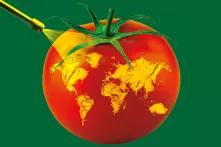More and more highly toxic pesticides are being used in agriculture worldwide, although the consequences for our ecosystem are serious.

[Click here to open the 12 lessons in full screen]
1: The global consumption of pesticides is increasing, even though the health and ecological consequences have long been known. International goals of BIODIVERSITY CONSERVATION can only be achieved if the use of pesticides is significantly reduced
2: Herbicides are applied against unwanted plants and are the MOST USED GROUP OF ACTIVE SUBSTANCES. Insecticides are effective against insects. Often even in smallest amounts and even against other insects that were not targeted.
3: About 385 million cases of PESTICIDE POISONING occur worldwide every year. People in the Global South working in rural areas are particularly affected.
4: Pesticides that are NOT PERMITTED IN EUROPE FOR ECOLOGICAL OR HEALTH REASONS are still produced here and exported to other countries. European companies are also involved in this business.
5: The EU has strict criteria for the authorisation of pesticides. But the harmful EFFECTS OF PESTICIDES ON WHOLE ECOSYSTEMS are not taken into account.
6: Pesticide active ingredients usually do not stay in the place they were applied. They can seep into the soil and GROUNDWATER, become airborne, or blow away – some can be found over 1,000 kilometres away.
7: Pesticides CONTAMINATE water via infiltration, surface runoff and drift. They also accumulate in the soil and exert adverse effects on soil life – sometimes for decades.
8: Pesticide residues in food can be HARMFUL TO PEOPLE’S HEALTH. Despite attempts to reach globally harmonized standards, maximum residue levels vary widely from country to country.
9: Four corporations from the Global North control 70 percent of the global pesticide market. They are EXPANDING THEIR BUSINESS to the Global South where pesticides are less strictly regulated.
10: Beneficial insects are the NATURAL ENEMIES OF PESTS and creating beneficial environments for them can help reduce the use of pesticides.
11: The EU has so far failed to reduce the use of pesticides. Its FARM TO FORK STRATEGY aims to change that by introducing a new regulation to half the use of pesticides by 2030. The EU’s Common Agricultural Policy is not yet aligned.
12: Unlike industrial monocultures, agroecological cultivation practices, including more crop rotations and combinations, empower farmers to use less or no pesticides. Some regions of the world are going ahead. But a binding international TREATY ON THE REDUCTION OF PESTICIDES does not yet exist.
